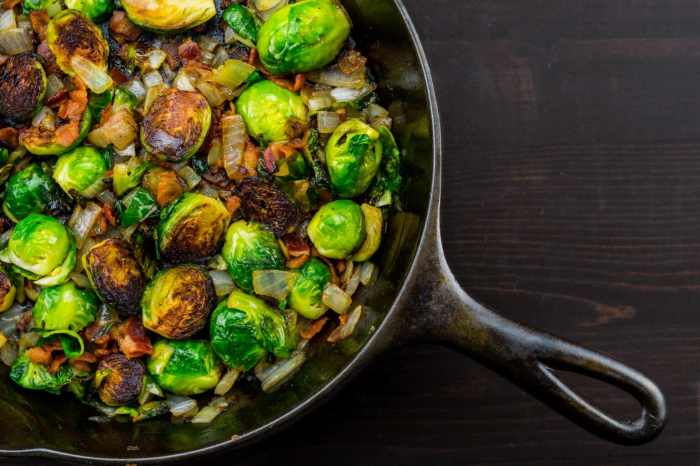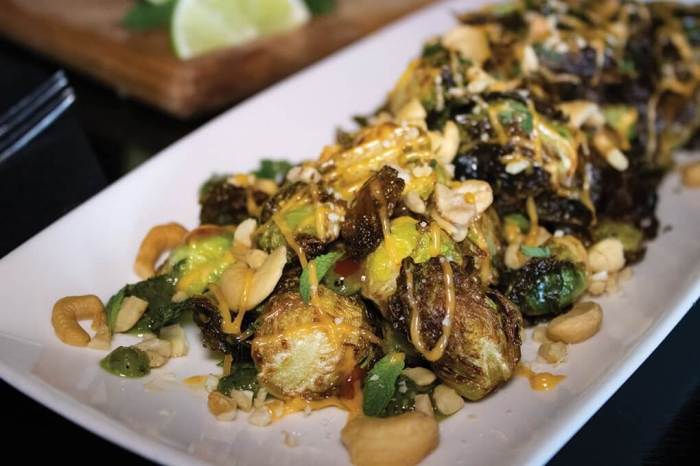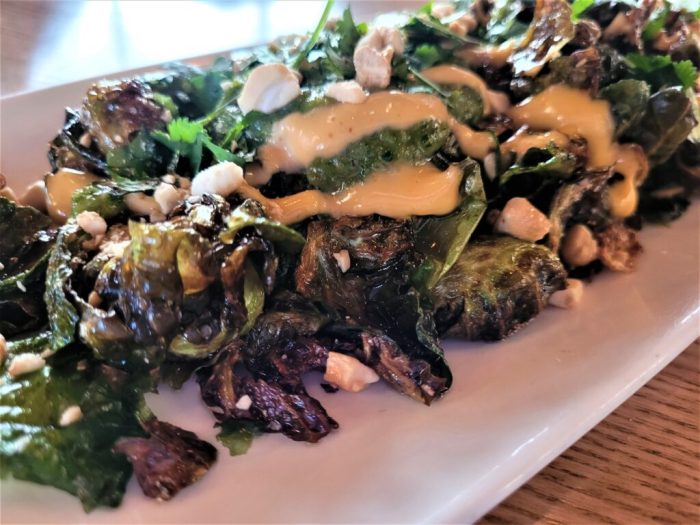Copycat cooper’s hawk brussel sprouts – Introducing the tantalizing Copycat Cooper’s Hawk Brussels Sprouts, a culinary masterpiece that will captivate your taste buds. This exquisite dish, inspired by the renowned restaurant’s signature creation, offers a perfect balance of flavors and textures, promising an unforgettable gastronomic experience.
Embark on a culinary adventure as we delve into the nutritional benefits of Brussels sprouts, exploring their remarkable antioxidant properties, vitamin-rich composition, and potential health-promoting effects. Discover the versatility of this cruciferous vegetable through an array of cooking methods, each unlocking unique flavors and textures.
Copycat Cooper’s Hawk Brussels Sprouts

Indulge in the tantalizing flavors of Cooper’s Hawk Brussels Sprouts with this meticulously crafted copycat recipe. Brussels sprouts, known for their nutritional value and versatility, are transformed into a culinary masterpiece with a harmonious blend of sweet and savory ingredients.
Ingredients:
- 1 pound Brussels sprouts, trimmed and halved
- 1 tablespoon olive oil
- 1/2 teaspoon salt
- 1/4 teaspoon black pepper
- 1/4 cup maple syrup
- 1/4 cup balsamic vinegar
- 1 tablespoon Dijon mustard
- 1/4 cup chopped pecans
- 1/4 cup crumbled goat cheese (optional)
Instructions:
- Preheat oven to 425°F (220°C).
- Toss Brussels sprouts with olive oil, salt, and pepper on a baking sheet.
- Roast for 20-25 minutes, or until tender and slightly browned.
- In a small bowl, whisk together maple syrup, balsamic vinegar, and Dijon mustard.
- Pour the sauce over the roasted Brussels sprouts and toss to coat.
- Sprinkle with pecans and goat cheese (if desired).
- Serve warm and enjoy.
Variations and Substitutions:
For a vegan version, omit the goat cheese and use a plant-based maple syrup substitute.
Substitute pecans with walnuts, almonds, or hazelnuts for a different flavor profile.
Add a teaspoon of minced garlic or a pinch of red pepper flakes for an extra kick.
Brussels Sprouts Nutrition and Health Benefits
Brussels sprouts, cruciferous vegetables belonging to the Brassicaceaefamily, are renowned for their nutritional prowess and health-promoting properties.
Nutritional Value
Brussels sprouts are a nutrient-dense food, offering an array of essential vitamins, minerals, and antioxidants. They are particularly rich in:
- Vitamin C: A powerful antioxidant that supports immune function and collagen synthesis.
- Vitamin K: Essential for blood clotting and bone health.
- Folate: A B vitamin crucial for cell growth and DNA synthesis.
- Fiber: Promotes satiety, regulates blood sugar levels, and supports digestive health.
Health Benefits
Consuming Brussels sprouts has been linked to numerous health benefits, including:
- Antioxidant Activity:Brussels sprouts contain high levels of antioxidants, such as sulforaphane, which help neutralize free radicals and protect against oxidative stress.
- Reduced Inflammation:Sulforaphane has anti-inflammatory properties that may reduce chronic inflammation, a risk factor for several diseases.
- Improved Blood Sugar Control:Brussels sprouts are low in carbohydrates and high in fiber, making them a suitable food for individuals with diabetes or prediabetes.
- Cancer Prevention:Sulforaphane has been shown to inhibit the growth of certain cancer cells, suggesting potential protective effects against cancer.
Incorporating Brussels sprouts into a balanced diet can contribute to overall well-being by providing essential nutrients, antioxidants, and protective compounds that support various bodily functions and reduce the risk of chronic diseases.
Brussels Sprouts Cooking Methods: Copycat Cooper’s Hawk Brussel Sprouts

Brussels sprouts are a versatile vegetable that can be cooked in a variety of ways, each with its own unique flavor and texture. Some of the most popular cooking methods include roasting, steaming, and sautéing.
Roasting is a great way to bring out the natural sweetness of Brussels sprouts. To roast Brussels sprouts, simply toss them with olive oil, salt, and pepper, and roast them in a preheated oven at 425 degrees Fahrenheit for about 20 minutes, or until they are tender and slightly browned.
Steaming is a gentler cooking method that preserves the nutrients in Brussels sprouts. To steam Brussels sprouts, simply place them in a steamer basket over boiling water and steam them for about 5 minutes, or until they are tender.
Sautéing is a quick and easy way to cook Brussels sprouts. To sauté Brussels sprouts, simply heat some olive oil in a large skillet over medium heat and add the Brussels sprouts. Cook the Brussels sprouts for about 5 minutes, or until they are tender and slightly browned.
Tips for Achieving the Best Flavor and Texture
- For the best flavor, choose Brussels sprouts that are firm and brightly colored.
- Trim the Brussels sprouts by removing the tough outer leaves and cutting off the stem end.
- To prevent the Brussels sprouts from becoming bitter, do not overcook them.
- Season the Brussels sprouts with salt and pepper to taste.
- Add other ingredients to the Brussels sprouts, such as bacon, onions, or garlic, for extra flavor.
Brussels Sprouts in Cuisine

Brussels sprouts, with their distinct flavor and nutritional value, are a versatile vegetable featured in various cuisines worldwide. Their firm texture and mild cabbage-like taste allow them to be incorporated into a wide range of dishes, from salads and soups to main courses and side dishes.
Culinary Versatility
Brussels sprouts can be prepared using various cooking methods, including roasting, steaming, sautéing, and grilling. Roasting caramelizes the sprouts, enhancing their sweetness, while steaming preserves their nutrients and tender texture. Sautéing adds a crispy exterior, and grilling imparts a smoky flavor.
Global Preparations
In European cuisine, Brussels sprouts are often served as a side dish, boiled or steamed and tossed with butter, salt, and pepper. In Germany, they are a popular addition to sauerkraut, while in Belgium, they are commonly paired with mussels.In
Asian cuisine, Brussels sprouts are incorporated into stir-fries, soups, and salads. In Japan, they are known as “mebachi” and are often used in tempura dishes. In China, they are stir-fried with garlic and ginger or added to hot pot.In North American cuisine, Brussels sprouts are often roasted with bacon, maple syrup, or balsamic vinegar.
They are also used in salads, soups, and as a topping for pizzas and pasta dishes.
Health Benefits, Copycat cooper’s hawk brussel sprouts
In addition to their culinary versatility, Brussels sprouts offer numerous health benefits. They are rich in vitamins A, C, and K, as well as fiber, antioxidants, and minerals. Studies have linked the consumption of Brussels sprouts to a reduced risk of certain types of cancer, improved heart health, and boosted immunity.
Brussels Sprouts Harvesting and Storage
Brussels sprouts are ready to harvest when the heads are firm and tightly packed. The ideal harvesting time is in the fall, after the first frost. This enhances the sweetness of the sprouts.
Harvesting Techniques
- Cut the stalks close to the ground with a sharp knife.
- Avoid twisting or pulling the sprouts, as this can damage the plant.
- Harvest the sprouts in the morning when they are cool and dry.
Storage Methods
- Refrigeration:Store Brussels sprouts in a perforated plastic bag in the refrigerator for up to 3 weeks.
- Freezing:Blanch the sprouts for 2 minutes, then freeze them in airtight containers for up to 6 months.
Shelf Life
The shelf life of Brussels sprouts depends on the storage method:
- Refrigerated: 2-3 weeks
- Frozen: 6 months
Factors that affect shelf life include temperature, humidity, and air circulation.
Popular Questions
How do I store leftover Copycat Cooper’s Hawk Brussels Sprouts?
Store leftovers in an airtight container in the refrigerator for up to 3 days.
Can I substitute other vegetables for Brussels sprouts in this recipe?
Yes, you can substitute broccoli, cauliflower, or asparagus for Brussels sprouts.
What is the nutritional value of Brussels sprouts?
Brussels sprouts are a good source of vitamins A, C, and K, as well as fiber and antioxidants.